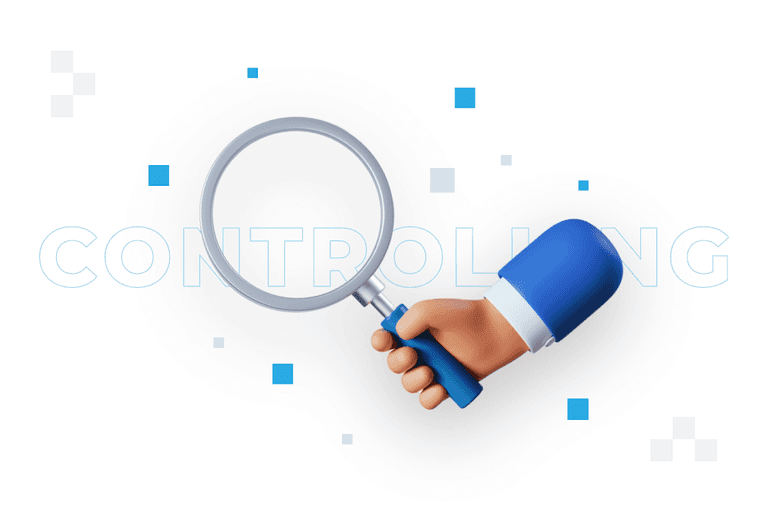
Controlling – what is it and what are its functions?

Controlling drives efficiency and is an essential planning tool in organisations. How does this practice help companies achieve financial and operational goals?
In this article you will learn:
- What is controlling?
- What are the types of controlling?
- What are the main principles of controlling?
- What are the tasks of controlling?
- What role does controlling play in the day-to-day operation of a company?
- Which tools are used for controlling?
- What can you gain from controlling?
Controlling – definition
Controlling is understood as an essential element of strategic management. It includes elements of risk and performance management, strategic planning and data analysis. As a concept in management, it emerged in the first decades of the 20th century, when controlling served to ensure the accuracy and reliability of financial data and was driven by the increasing operational complexity of businesses and the need to better manage resources. As the economy developed and competition increased, controlling began to evolve – after the Second World War it began to be seen as a tool to improve operational efficiency and effectiveness, and the role of controllers changed to focus on planning, analysis and interpretation of data.
Controlling is the process of managing an organisation’s finances and operations to optimise performance.
Definition of controlling
During the 1970s and 1980s, not only did the complexity of controlling increase, but also its role in the operation of an organisation. More emphasis began to be placed on strategic planning, risk management and cost and performance analysis, and controllers became advisors in decision-making processes.
Types of controlling
Controlling, as an element of organisational management, takes different forms depending on the specific activities, objectives and structure of the company. Here are some of the main types of controlling:
- Operational controlling – focuses on short-term activities and processes in the organisation to optimise operational efficiency, manage costs and improve financial performance in the short term.
- Strategic controlling – is oriented towards the strategic goals of the organisation. It supports high-level decision-making processes by analysing market trends, assessing growth opportunities and identifying risks.
- Financial controlling – focuses on the financial aspects of a company’s operations. Includes profitability analysis, cash flow management, cost and investment control and capital structure optimisation.
- Project controlling – helps to plan, monitor and control project costs and manage time and scope of tasks.
- Quality controlling – focuses on monitoring and improving the quality of products or services. It influences customer satisfaction, process efficiency and often involves the implementation of quality management standards and systems.
Main principles of controlling
Controlling requires adherence to certain principles – these may vary depending on the specifics of the organisation, but there are some universal guidelines. One of the fundamental principles is its integration with decision-making processes in the organisation – it is not an isolated task as it assists management at various levels, which requires not only the provision of data but also its analysis and interpretation in the context of the organisation’s objectives. Equally important are continuity and systematicity. Controlling is a continuous process, which allows strategy and operations to be adapted quickly to current conditions.
Transparency and reliability of information are equally important controlling principles, as business decisions should be based on accurate, timely and complete data. This does not change the fact that systems and processes should be flexible enough to adapt to a changing business environment, new strategies or internal changes in the organisation.
One of the most important principles of controlling is to be future-oriented – it not only serves to analyse past performance, but also helps to forecast and plan future activities. It is essential to see the whole process as a continuous, dynamic and integrated activity that supports the management of the organisation.
Tasks of controlling
Controlling in an organisation performs a number of important tasks that support effective management and the achievement of business objectives. Through their implementation, the organisation operates effectively and controlling, as an integral part of management. Here are some of the most important tasks of controlling:
- It is essential to the financial and operational planning process, which includes the development, evaluation and updating of budgets and strategic plans.
- It is used to continuously monitor operational and financial performance by identifying deviations and analysing their causes.
- It is needed in the analysis of financial and operational data. Reports and analysis are key in decision-making, as well as in communication with stakeholders.
- Provides managers with the information they need to make informed decisions, which applies to both strategic and operational decisions.
- Helps identify areas for improvement – e.g. in cost management.
- It is used to identify and manage business risks.
- It plays an important role in change management and helps the organisation adapt to changing market, technological and internal conditions.
- By identifying opportunities for growth, innovation and efficiency improvements, it contributes to the long-term development of the organisation.
The role of controlling in the company’s day-to-day operations
The presence of controlling in the day-to-day operations of a company can be sensed in the way an organisation plans its activities, monitors progress, makes decisions and responds to changing conditions. Above all, it is evident in the planning and budgeting process – thanks to controlling, the company’s plans are based on solid data and realistic assumptions, and resources are allocated where they can bring the greatest benefit.
Controlling also ensures that the company regularly evaluates activities in the context of set targets and reacts quickly to deviations, maximising the chances of success. However, care should be taken to ensure that it is not seen as a repressive tool – instead it should foster a culture of continuous improvement.
Controlling should not be a tool that limits initiative or inhibits innovation. Nor should it be allowed to become an end in itself, distracting from real business objectives. Nor should it be based solely on historical data, but also actively analyse trends and forecasts.
Tools used in controlling
Controlling uses a number of tools to help the organisation manage and make decisions effectively. They help controllers and managers to effectively manage the company’s finances, operations and overall strategy. Here are some of them:
- Management information systems (MIS) are software used to manage key information. They are integrated platforms that process data from various sources to provide synthetic reports and analysis.
- Enterprise resource planning (ERP) systems are comprehensive information systems that integrate all operational and management aspects of an organisation, from production to accounting.
- Financial ratio analysis is a method of assessing the financial health of an enterprise by analysing profitability, liquidity, debt or capital efficiency.
- Sales budgeting is a financial planning process in which revenue and expenditure forecasts are determined.
- Deviation analysis involves comparing actual results with planned results and identifying the reasons for differences.
- Benchmarking is the process of comparing a company’s products, services, processes and practices with best practice in the industry or among competitors to identify areas for improvement.
- Activity-Based Costing (ABC) is a costing method that assigns costs to products and services based on actual resource consumption.
- Cash flow management (also known as Cash Flow Management) involves monitoring, analysing and planning a company’s financial flows to ensure liquidity.
Benefits of controlling
One of the main benefits of controlling is improved decision-making, as accurate analyses and reliable data enable managers to make more informed decisions. This translates into increased operational efficiency and allows them to find areas where efficiency can be improved, costs reduced and processes optimised.
Another important benefit of controlling is better financial control – monitoring financial flows and budgets allows problems to be detected earlier and prevents potential financial crises. This helps to better manage risks and supports strategy development and other company initiatives, as it allows a better understanding of market trends and the exploitation of new market opportunities.
Controlling is also essential in building an organisational culture in a company. It promotes a data-driven approach, which encourages the analysis of results and the continuous search for ways to improve the organisation’s performance.
FAQ
Footnotes
Contact form
Ensure the development of your business
Rate content:
You may be interested in:




